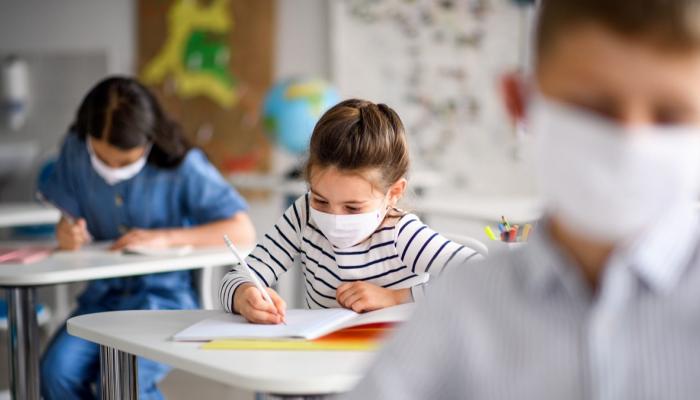UNICEF: Supporting your children return to school during COVID-19

Shafaq news/ The Coronavirus outbreak has caused major disruptions to daily life, and children feel these changes deeply.
Children are likely to be experiencing a range of emotions. The return to school will be welcome and exciting for many students, but others will be feeling anxious or frightened.
UNICEF has issued advices for parents to support their children with the complicated emotions they may be experiencing and ease them into the new normal at school.
My child is worried about getting sick at school and doesn’t want to go back. What can I do?
Starting school or starting a new school year can be stressful at the best of times, let alone during a global pandemic. Children may feel nervous or reluctant to return to school, especially if they have been learning at home for months.
Have an open conversation with your child about what’s worrying them and let them know that it’s completely normal to feel anxious.
Talk to them calmly about some of the changes they may expect at school, such as needing to wear masks and keep a distance from their friends and teachers. Reassure them that these safety measures are in place to keep students and teachers healthy. You can also highlight the important role they can play in keeping themselves healthy, such as washing their hands with soap and water.
Remind children about the positives — they will be able to see their friends and teachers and continue learning new things.
Is there anything I should look out for as my child starts back at school?
The coronavirus outbreak has caused major disruptions to daily life, and children are feeling these changes deeply. As your child returns to school you should keep an eye on their physical health, learning, emotions and behavior.
Look out for these signs of stress and anxiety to gauge if your child needs extra support from you, Sadness , Worry , Anger , Agitation , Fatigue , Confusion , Lack of interest in playing with other children or completing their homework , Not sleeping or eating well , Loss of interest in their hobbies or friends
Before children go back, remind them it’s normal to feel overwhelmed at times. Encourage them to talk about how they’re feeling and let them know you are always there to listen.
There have also been concerns that bullying may increase when children return to school, due to some of the misinformation around COVID-19.
You should explain that the virus has nothing to do with what someone looks like, where they are from or what language they speak.
My child’s school is recommending children wear protective clothing, which is making them feel more nervous. What should I say to them?
Approach this conversation with empathy. Tell your child that you know they are feeling anxious about coronavirus, but that it’s healthy to talk about our worries and emotions. Children may also get upset or frustrated if they are finding it hard to wear masks, especially when running or playing.
You can reassure your children that lots of adults are working hard to keep your family safe, but emphasize that it's important we all follow the recommended measures to take care of more vulnerable members of our community.
How can I encourage my child to follow precautions (such as frequent hand washing, physical distancing, etc.) at school without alarming them?
One of the best ways to keep safe from COVID-19 and other diseases is to simply encourage regular hand washing with soap. At school children will see new signs near their classrooms. They should wash their hand regularly and remind their friends to do the same.
You can also show children how to cover a cough or a sneeze with their elbow, and ask them to tell you if they start to feel like they have a fever, cough or are having difficulty breathing.
My child’s sleep patterns have changed during lockdown and I’m worried about how they’ll cope when they go back to school. How can I support them?
Children’s sleep habits, and quality of sleep, might have changed during lockdown. This might make getting back into a school routine difficult.
Get your child back into a routine of waking up before they return to school. Move the time that you wake your child up earlier over a number of days, to help them adjust.
Don’t let them nap during the day. Avoid screen time when they wake up and at least an hour before they go to bed. Develop a routine and stick to it.
The day before they go back to school, try to have a calm evening, with plenty of time for settling and preparation.
How can I gently check in to see how my child is coping?
Be proactive in your conversations with children. Some children may come to their parents wanting to talk. But others will need their parents to create the space for discussion.
Check in with children and ask how they’re doing. You can also create opportunities for your child to express themselves through activities like playing and drawing. This can help them communicate any negative feelings they may be experiencing in a safe and supportive environment.
It’s likely children’s emotions will change regularly and you need to show them that’s okay. Listen to their concerns, speak kindly and reassure them. Children often take their emotional cues from the adults in their lives. So manage your own emotions and remain calm and open.
My child has struggled to study from home and is worried about being very far behind their classmates. How can I help and reassure them?
Many children have struggled to continue learning during lockdown. As they return to school, they may be fearful about facing this, especially in comparison to other children.
During this time it’s important that parents prioritize their children’s wellbeing and adjustment to the new normal over their learning outcomes. When children feel loved and supported they’re going to learn better.
You can also talk to your child’s teacher about the support systems they have in place to help children who have fallen behind during lockdown.
My child is worried about being bullied at school. What can I do?
If your child is worried about bullying either in person or online, it’s important to let them know that they are not alone and they can always talk to you or another trusted adult. The more you talk to your children about bullying, the more comfortable they will be telling you if they see or experience it.
Check in with your children daily and ask about their time at school and their activities online, and also about their feelings. Some children may not express their emotions verbally, so you should also look out for any anxious or aggressive behavior that may indicate something is wrong.
You should also talk to your children about staying safe online. Have an honest discussion about who they communicate with and how. Make sure they understand the value of being kind and thinking carefully about their online postings. Encourage them to tell you or a trusted adult immediately if they experience any mean or negative contact online.
If you notice your child becoming withdrawn or upset, or using their device more or less than usual, it could be a sign that they are being bullied online.
I'm anxious about being away from my child when they go back to school. What can I do to calm down?
The last few months may have been very stressful for you and your family. You might be dealing with your own grief and loss or worried about financial issues and your own fears of COVID-19.
Parents have also gotten used to having their children around them all the time during lockdown. And the thought of being separated from them as they return to school may be causing them additional stress and pressure.
Children are very sensitive to the emotions of their parents, so it’s important that you take care of your own mental health, as well as theirs.
Shafaq News / The Coronavirus outbreak has caused major disruptions to daily life, and children feel these changes deeply. While many children feel yearning and excited to return to school, others feel anxious or afraid about it.
It is also important to familiarize yourself with your child's school safety procedures, policies against bullying, as well as appropriate referral mechanisms and availability of dedicated phone lines to provide assistance.





